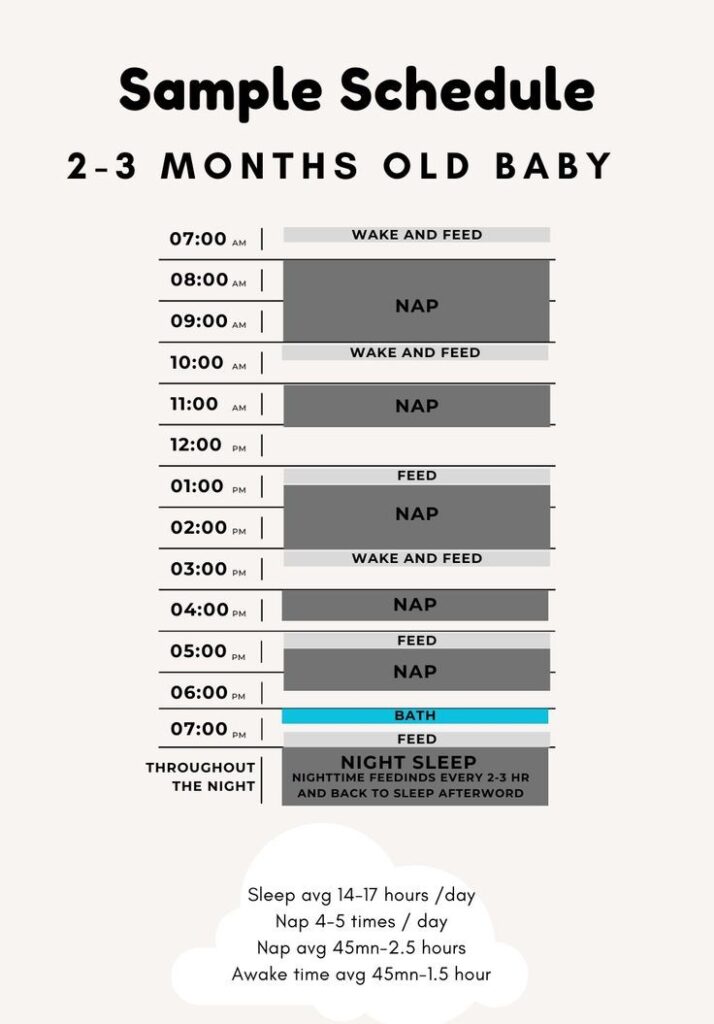Sleep Facts for 2-3 Months Old Baby
- Average sleep duration is 14 to 17 hours per day
- Average nap duration ranges from 45minutes to 2.5 hours
- Average awake and playtime duration is 45 minutes to 1.5 hours
- Nap 4-5 times per day

Sample Sleep Schedule for 2-3 Months Old Baby
Below is a sample sleep and feed schedule for a 2-3 month-old baby. It’s important to note that every baby is different, so this schedule may need to be adjusted based on your baby’s individual needs and cues:
7:00 AM: Wake up and feed Begin the day with a feeding session, either breastfed or bottle-fed. This provides your baby with the nutrition needed to start the day.
7:30 AM: Playtime and Awake Period Engage your baby in some gentle playtime activities, such as talking, singing, or playing with toys. This helps stimulate their senses and encourages development.
8:00 AM: Nap Time After approximately 1 hour of awake time, your baby may start showing signs of tiredness. Put them down for a nap in their crib or bassinet in a darkened, quiet room.
10:00 AM: Wake up and feed When your baby wakes up from their nap, offer another feeding session to satisfy their hunger and provide nourishment.
10:30 AM: Awake Period Enjoy some more playtime and interaction with your baby, allowing them to explore their surroundings and engage with you.
11:00 AM: Nap time Around 1-1.5 hours after waking from the previous nap, your baby may be ready for another nap. Follow their cues and help them settle down for some rest.
12:00 PM: Wake up and playtime After waking from the nap, offer another feeding session to keep your baby satisfied and provide them with the nutrients they need for growth and development.
1:00 PM: Feed and nap time Your baby needs another nap in the late afternoon to recharge. Help them settle down for some rest in a calm and comfortable environment.
3:00 PM: Wake up and feed When your baby wakes up from their nap, offer another feeding session to ensure they’re getting enough nutrition before bedtime.
3:30 PM: Awake Period Engage in more playtime activities with your baby, such as tummy time, singing, or gentle sensory play.
4:00 PM: Nap Time Your baby may need another nap in the late afternoon to recharge. Help them settle down for some rest in a calm and comfortable environment.
5:00 PM: Feed and nap Offer a feeding session followed by another short nap to ensure your baby is well-rested before bedtime.
7:00 PM: Bedtime Routine Begin your baby’s bedtime routine, which may include a warm bath, gentle massage, bedtime story, or lullabies. This helps signal to your baby that it’s time to wind down and prepare for sleep.
7:30 PM: Feed and Bedtime Offer a feeding around this time before they go to bed for the night. This can help extend the length of their nighttime sleep. Put your baby down to sleep in their crib or bassinet, drowsy but awake. This helps them learn to self-soothe and fall asleep independently.
Throughout the Night: Nighttime Feedings
Your baby may wake up for nighttime feedings as needed. Offer feedings in response to their hunger cues, keeping the environment calm and quiet to encourage them to go back to sleep afterwards.
Remember that flexibility is key, and it’s important to follow your baby’s cues and adjust the schedule as needed to meet their individual needs.

